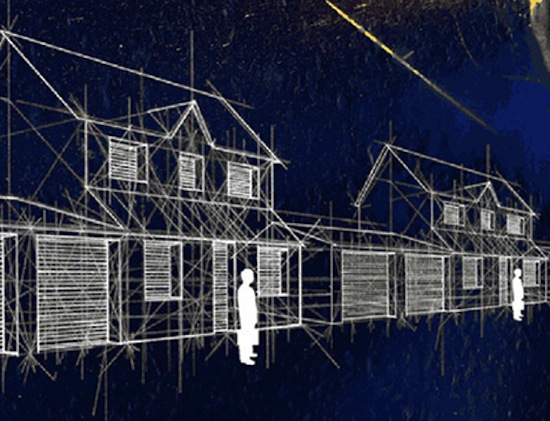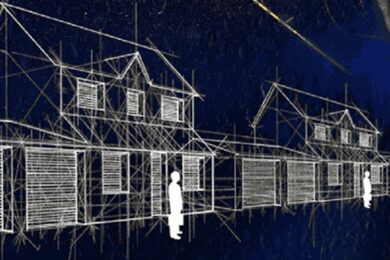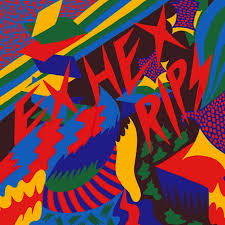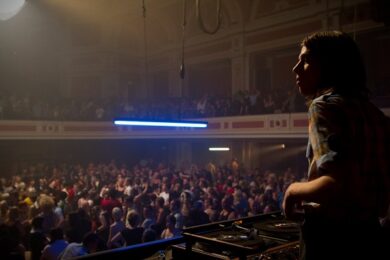Scene: I’m watching reruns of an old kids’ cartoon I used to love: The Jetsons. I grew up wanting to take a flying car to school because of this show. It’s the 21st century and there are no flying cars. What the hell is up with that? So disappointing.
But I watch the show now, as an adult, and I notice something: there’s nobody even slightly brown in the Jetsons’ world. Even the family android sounds white. This is supposed to be the real world’s future, right? Albeit in silly, humorous form. Thing is, not-white-people make up most of the world’s population, now as well as back in the 1960s when the show was created. So what happened to all those people, in the minds of this show’s creators? Are they down beneath the clouds, where the Jetsons never go? Was there an apocalypse, or maybe a pogrom? Was there a memo?
I’m watching The Jetsons, and it’s creeping me right the fuck out.
Counterscene: I’m listening to Violet Stars Happy Hunting! Janelle Monáe’s singing about herself as an android being hunted for daring to fall in love with a human man. There’s a whole agency devoted to tracking down androids who do this – apparently it happens a lot. The hunters have a few dialogue lines in which they speak with an obvious African-American dialect, as they gleefully contemplate ripping out her "cybersoul" with a chainsaw. The whole thing seems awfully inefficient; why they don’t just program the androids not to fall in love, I don’t know. The Jetsons’ android certainly seemed happy enough with her lot. Maybe servants work harder if they’re left the illusion of choice? I’m probably over-thinking this.
Monáe’s future sounds hellish, at least for the robots. Yet it doesn’t scare me half as much as the Jetsons’ future did.
Where the hell are we? I’ve been consuming SF and fantasy since I was a child. Started with mythology and folklore, worked my way through the Golden Age greats, peppered this with Dungeons & Dragons and endless Star Wars emulations. My father fed my habit by watching classic Twilight Zone and Star Trek episodes with me, every summer-holiday weeknight at two in the morning, Channel 11. I dreamed of going to Space Camp, though my family couldn’t afford it. I started writing about talking animals and the apocalypse at the ripe old age of eight and never stopped. If there’s anyone who was born and raised a geek, it’s me.
Yet even then I noticed that there was no one like me in most of my geekery. This was in the days before the first black female astronaut, Mae Jemison (no relation), and when the closest thing to non-white people that anyone saw in fantasy were orcs. There were a few notable examples that I can remember offhand: Ursula Le Guin’s Earthsea series, Clarke’s novel Childhood’s End. That was pretty much it.
My father tried to supplement these rare delicacies by introducing me to Afrofuturist staples. Parliament Funkadelic became my new (old) favourite band, and we both loved the indie film The Brother From Another Planet. Unfortunately these supplements just reinforced my sense of alienation. Why did I have to travel to the margins of speculative fiction to see anything of myself? Why was it easier to find aliens or unicorns than people of colour or realistic women?
Then I began to realise the exclusions I’d noticed were not just a matter of benign neglect. Robert E Howard wrote endless pulp stories set in fantastical Africa and Asia – and centred all of them on white men. Nebula and Hugo winner Samuel Delany, in his 1998 essay Racism And Science Fiction, shares his experience of having a story rejected by one of the most celebrated editors in the genre solely because the protagonist was black.
These were conscious choices on the part of the genre’s gatekeepers. This was deliberate, ahistorical, scientifically nonsensical exclusion. Worse, the fans supported the gatekeepers in this. A published story containing a single error of theoretical physics might elicit pages-long, rage-filled letters to the editor, but if a story by the same author depicted black men as white-woman-raping cannibals incapable of sophisticated thought, the response was resounding silence.
These were the people who made the speculative fiction that I loved. They could not empathise with people like me, and they didn’t want to try. They weren’t comfortable letting us into their archetypal playgrounds at all, let alone in any number. When we did appear, the roles we took were limited, non-threatening to the writer’s sense of superiority: the thug, the slave, the exotic sex toy.
If I wanted to see people like me, doing things I could relate to, I had to look to my own. Most of what I found from creators of colour went to the opposite extreme, probably in an attempt to counter the extreme whiteness everywhere else. But I wasn’t any more interested in all-black futures than I was in all-white futures. I just wanted fantasies of exploration and enchantment that didn’t slap me in the face with you don’t belong here messages. I just wanted to be able to relax and dream.
Enter my psychological lifelines: writers such as Octavia Butler, in science fiction. And in music, artists such as Janelle Monáe.
Scene: I’m reading some fat fantasy book set in Yet Another Faux Medieval Europe. Nothing in this story jibes with my understanding of actual medieval Europe. There’s no fantasy version of the Silk Road bringing spices and agricultural techniques and ideas from China and India and Persia. There’s been no Moorish conquest. There aren’t even Jewish merchants or bankers, stereotypical as that would be. Everyone in this ‘Europe’ looks the same but for minor variations. They speak the same language, worship the same gods; everyone, even the very poor people, seems inordinately concerned with the affairs of the nobility, as if there’s nothing else going on that matters. There are dragons and magic in the story, but it’s the human fantasy that I’m having trouble swallowing.
It doesn’t matter which book I’m reading. I could name you a dozen others just like it. This isn’t magical medieval Europe; it’s some white supremacist, neo-feudalist fantasy of same, I’m so sick of it that I put the book down and open my laptop and start writing. Later people read what I’ve written and remark on how angry the story is. Gosh, I wonder why.
Counterscene: it’s the middle of the American presidential election, and my television is full of hate. Republican candidates are doing everything short of saying,"Vote for us if you don’t want women and brown people to take over!" Except some of them are saying that, too. Mitt Romney’s just been endorsed by some frothing bigoted rage-monster of a rock star. He’s not much of an artist but a hell of an attention- getter, so who’s Obama got to counter that?
I see it first on Twitter: Janelle Monáe says that her song ‘Tightrope’ is dedicated to Obama. It makes a wonderfully subversive kind of sense. In the ‘Tightrope’ video, people interned in a stereotypical insane asylum defy authority by dancing – something that leads to, according to the video’s text,"illegal magical practices". And what could be more magical than the idea that a black man might be elected president twice in this ridiculously racist nation?
In the video, the asylum patients are all black, though their specific skin colours range across the spectrum of the diaspora. The bad guys aren’t white; Monáe isn’t interested in clichés. Instead, they have mirrors for faces. They are us. The whole thing culminates in a crowd dance scene that’s pure Congo Square, or any place where historically the oppressed have found joy in defiance of their oppressors.
I can’t listen to this song without dancing. I’m a terrible dancer but I don’t care. I lose myself in it because Monáe’s magic is for everybody.
Oh, and also: Obama wins.
Monáeism: as I write this, it’s February, Black History Month in the USA. Everyone jokes that of course black history gets celebrated only during the shortest month of the year. No one seems puzzled by the fact that there is no time correspondingly devoted to examining, celebrating or imagining the black future.
It’s easy to look at something like Monáe’s mythos and see only the obvious metaphors. Her androids’ struggle for the freedom to love after all parallels the struggle of American slave women to marry legally, to keep their children, to control their very bodies, in a system that cruelly commodified these activities. But it’s wrong only to apply an historical, and racial, lens to the work of any modern black woman. We have spent generations sharing the struggles of other oppressed groups, collaborating with and occasionally being betrayed by them, and progressing nonetheless. We’re the ones who (literally) wrote the book on intersectionality. And it’s clear that Janelle Monáe feels no sense of threat from the others with whom our future will be shared. She welcomes all, with love and dancing.
And yet. When I watch her videos and listen to her lyrics I’m shocked to see so much of myself in this ultra-technological future – despite my own writings, despite my own knowledge that black history and myth abounds with techies and innovators, despite my life and my long-held desire to see this very thing. It’s not Monáe’s ability to imagine an inclusive future that’s remarkable, but my subconscious resistance. What the hell is wrong with me, that her vision feels so strange?
Too many years of The Jetsons, maybe. Too many white-supremacist medieval Europes. I’ve spent years swallowing these bizarro-world versions of humanity, and they have become a toxin poisoning my imagination. But Janelle Monáe is a tiny, fast- footed, pompadour’d antidote to all of that.
Scene: I’m watching Tron: Legacy. It’s a scene of glitzy decadence: a posh nightclub in a cybernetic dystopia, whose denizens are not human but certainly look the part. They’re beautiful people, with perfect faces and languid bodies and apparently nothing better to do with their time than lounge about flirting or whatever beautiful people do. Everyone wears white or black. Everyone I see has white skin, at first.
Then I see some black characters. They stand clustered together amid all this elegance, one obviously on guard, the rest tense and martial and definitely not comfortable in this environment. Stiffly they petition the club’s proprietor for an audience. This group’s leader is the only person in the whole movie who seems to have a scar, located prominently on his face. He’s not meant to be one of the beautiful people, plainly.
Five minutes later there’s an action scene, and all the black characters die.
Counterscene: I’m watching Janelle Monáe’s Many Moons short film, which a friend has emailed to me with a cryptic "HOLY SHIT WATCH THIS!" note. It’s a scene of dystopian decadence supported by android labour: there’s a slave auction going on, but it looks more like a fashion show. While her fellow commodities prance about on display, Janelle Monáe’s character is blowing up the stage. An audience of hoi polloi screams and jiggles all around her. It’s completely nonsensical, and completely entrancing.
People like me are everywhere. The slaves and cops, okay, that’s normal. That’s what I’m used to. But we’re also present among the decadent elite. Monáe’s screaming fans display all the colours of humanity: white and brown and yellow and black and red. All of the video’s imagery fits this colour palette. It’s not just racial differentiation I see, either. In the mostly female audience there’s a pretty, big-breasted white woman about to pop out of her shirt over Monáe, and Monáe herself is about as genderqueer as you can get while still being named Janelle.
It gets weirder. An army of androids dressed like Amelia Earhart marches across the stage. The auction’s prices are rendered in Sterling, not dollars; guess the Commonwealth’s doing okay in this future. The auction’s glamorous announcer speaks in almost incomprehensible accented English, so apparently immigrants can make out big in this world too. There’s a middle-aged Chinese vampire dandy in the audience – yeah, I don’t know either, but it doesn’t jar my suspension of disbelief, because there’s just so much else to look at that I do believe. I can swallow the batshittery because everywhere else there is comforting, delightful normalcy.
I’m not sure this future is the kind of place I’d want to live in, but I definitely wouldn’t mind visiting. And for as long as Janelle Monáe is willing to offer my imagination this kind of gleeful romp, I’ll keep coming back.
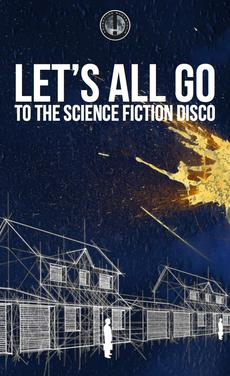
NK Jemisin is a Brooklyn-based author of speculative fiction. Her novels include The Killing Moon (Orbit). www.nkjemisin.com
To buy Adventure Rocketship! Let’s All Go To The Science Fiction Disco, which includes pieces on Mick Farren, The Orb, Michael Moorcock, Funkadelic, plus fiction and much more, head: here for the print copyor here for the ebook

